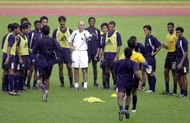The London-born Stephen Constantine is an inveterate globe-trotter, having plied his trade across four continents – Europe, Asia, Africa and America. He currently is manager of the Cypriot top division side Ethnikos Achna. He has managed a few other clubs earlier and was also first team coach of Millwall FC besides working with the national teams of Nepal, India, Malawi and Sudan. A few years ago, he was on the radar of an I-League club but that was not to be. The UEFA Pro License holder and FIFA coach shares his coaching philosophies and provides other interesting insights in this exclusive interview with Sportskeeda.
Coach, how’s it going with Ethnikos Achna and what target have you set out to achieve this season?
I recently joined Ethnikos and the team was winless in eight months. So, the need to get the team playing the right way and to change the philosophy was very important. We have managed to win a few games, in fact, we went on a four game unbeaten run, winning three games in a row recently. So we have made good progress but still have a long way to go.
Now that this season is winding down, any plans or offers in hand for the next season?
Well, as I said, I signed a short-term deal until the end of the season and will most likely look to move on. I have a few things in the pipeline but nothing definite, so I’m open to offers at the moment.
I’m sure you’d love to come back to England but why are English clubs not looking you up despite some positive reviews about your work in Cyprus and other nations?
I have had some interest from the UK and in the summer, was interviewed for the Manager’s position at Gillingham; there has been interest but no solid offers as yet. I think it’s a combination of things really, I am not in England and perhaps the feeling is that better the devil you know. I do feel however that I bring something different to the table than a lot of other managers as a result of my experiences from around the world and well, one day it may happen, you never know!
You’ve coached in Asia, Africa, Europe and America – how’s the football different across the four continents in terms of talent, facilities and administration?
All have their pluses and minuses, in Europe for the most part, you have very good organisation and usually very good facilities, naturally, the talent is there. In Asia, I think you have decent facilities and generally the organisation is there and the drive to get better is strong. There are some fantastic leagues around Asia and for me, it will continue to grow.
Africa is something very unique, the talent is everywhere and the ability of the players, well, is huge; the facilities though are largely dependent on where you are in Africa and the same goes for the organisation; over the past few years and with FIFA’s help, it has and continues to improve every year. The recent success of the last World Cup (minus the dreaded vuvuzelas) and the recent African Cup of Nations shows that African football is on the up. Of course, there are problems in football all over the world, it’s just that the problems are of a different nature.
What’s the difference in coaching between England and Europe?
I think the emphasis in Europe is more about working with the ball and having a holistic approach to the game, the players get more time with the ball and the winning of games at youth level, U-14s and below is of less importance. We have some great coaches in the UK and some great talents, but when you are more concerned about winning games at that level and trying to play quickly when the technique is not there, it is surely going to have an effect. To be fair, that attitude is slowly changing but when you look at the success of some of the other countries, you would expect England to be up there and sadly that is not always the case.
Where does Asia and especially India need to catch up?
Asia has made huge strides in recent years and the AFC really have tried to bring the level up to the standard it needs to be. There are as we know, some very good and very well organised leagues in many Asian countries but I do feel that the level of coaching in some of them is below par. I honestly feel that we need to improve the quality of coaches for the level of the players to be higher. Quality, not quantity, is the mantra I would want to see.
India, for me, has the potential but has yet to kick on despite all the world interest and that is down to the general lack of facilities and the lack of any real development across the country. I know FIFA and the AFC are doing everything they can but the local state associations and the AIFF need to do more, and, of course, the states have to want to if India is ever going to be where it wants to be.
Who are the football managers you admire and who has most influenced your coaching philosophy? And what is your coaching philosophy?
There are so many managers around the world that I look up to and admire, perhaps too many to mention. I have been fortunate enough to meet some great managers and watch training sessions and that is always a great thing, but coaching is personal; you may get to see Arsene Wenger conduct a session but it is never going to be the same when you do it. You have to put your own character and personality and enthusiasm into the session and then understand what you want to get from the session.
I like to play attacking, free flowing football but who doesn’t — the question is what type of players you have to work with. Can they do the things you are asking them to do? So really, it is all about the players and then in your sessions and meetings, you get the players to buy into what you are trying to do. I think having been able to work in different countries and different continents, I have managed to take a little something from all and I believe I have a very open approach to the game.
What did you try to implement during your spell with India and what was your experience like? In the end, it all went awry, didn’t it?
India was at a very difficult stage when I arrived in 2002 — we didn’t even have a kit sponsor and the general attitude toward the national team was not very good, to be honest. I was very lucky that I had a certain Mr Alberto Colaco who really was someone who cared deeply about his work and Indian football. I managed to bring in Adidas and later Nike came and that of course was ground breaking at the time. I tried to bring in some professionalism, both on and off the field, and was helped greatly by Bhaichung Bhutia, I M Vijayan, Jo Paul Ancheri and Debjit Ghosh who all as senior players accepted me and were a big reason why we had the success we had in my time there. They all wanted to learn and improve and with them, believing in what I was trying to do had an affect on all the players throughout the league and the entire country. My three years in India were something special, we did things that no one thought possible and I don’t just mean the LG Cup win or the performances in the Busan Asian Games and the winning of the Ian Rush Trophy.
Of course, I had problems with some state associations who put the state league above the national team and there were many occasions that were very frustrating, but that’s football and I finished a three-year contract and in fact was offered an extension which I turned down to return to the Championship with Millwall in England. India has and will have a special place in my heart and the last thing I have to say on that is Jai Hind!
What do you remember of the Indian players you worked with, did any of them particularly impress you with their talent or work rate?
All of them — there are too many to mention, plus I had some great help on the coaching staff and support staff as well. Dr Vece Paes was huge in terms of helping me set up the medical and the testing of the players. In the youth set up I had Sateveen Balan from Kerala; he was great with the young players and Alok Mukerjee was also great, as was Rogerio Ramos, the goalkeeping coach. The work rate was illustrated in most of our games, the deep runs of Samir Naik and Climax Lawrence were non-stop. Abhishek Yadav, Deepak Mondal, all of them really worked very, very hard.
What do you look for in players? Talent, dedication or discipline?
Attitude is very important for me and if that is not right, then you are never going to get the best out of the player, discipline being part of that. I feel it’s about looking after yourself, it’s about looking after your team mates and if your attitude is poor, that is going to have a negative effect. Talent is never enough by itself and you need, no, you must have dedication and a love for the game to be successful.
You’re an Arsenal fan and have personally interacted with Arsene Wenger on several occasions. What’s wrong with the Gunners?
Yes, I have been lucky enough to meet him several times and been invited to watch his training. He is a great coach and a very nice man as well.
Well, I think that is a difficult question to answer but I will say that although we have not won anything in last several years, we have produced some wonderful football and built a state-of-the-art stadium in the Emirates. Paying over the top wages for players is not the way forward and a lot of teams have done that and are doing that; and yes, I know many fans are not interested in that unless you’re winning trophies. But with the grim economic situation the world over and the new financial fair play laws that will come into affect, Arsenal will be in a very, very good position and as a result of that forward planning, I am sure we have a great future ahead of us. And that is down to the manager and to the board for having the character to stay with the right man for the job, Arsene Wenger!
All top Premiership teams barring Manchester United are not playing to their potential this season. Does this represent a regression for English football in the current scenario?
I am not sure that they’re not playing to their potential. The season in England is long and hard and when you add UEFA competitions and FA Cup, League Cup, there are in excess of 60 competitive games and it is not easy to sustain that (form) over an eight-nine month period. I think English football is still the number one place to be.



